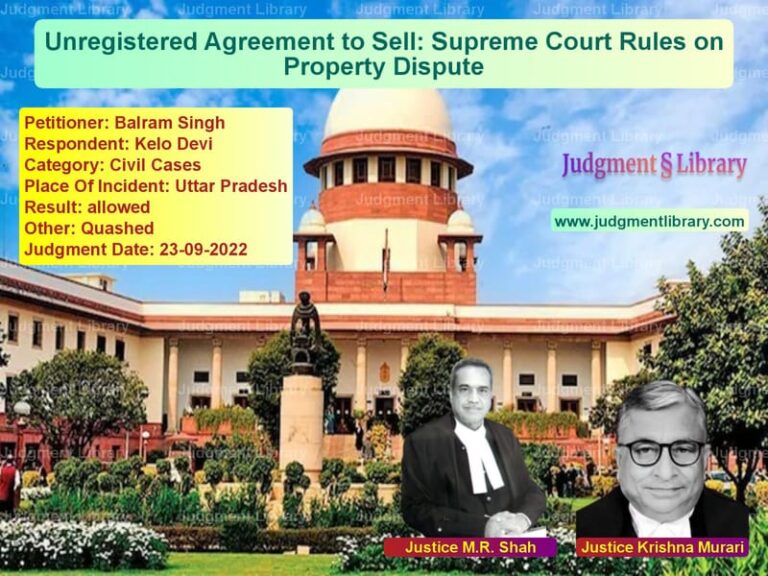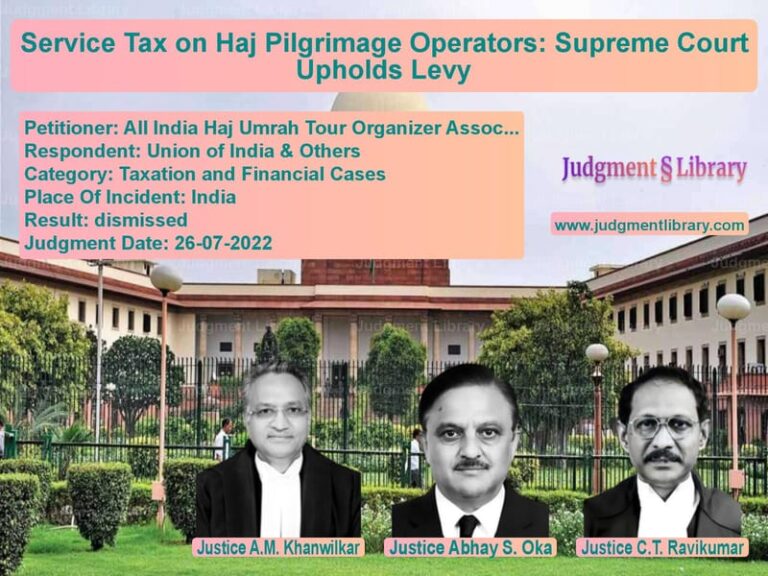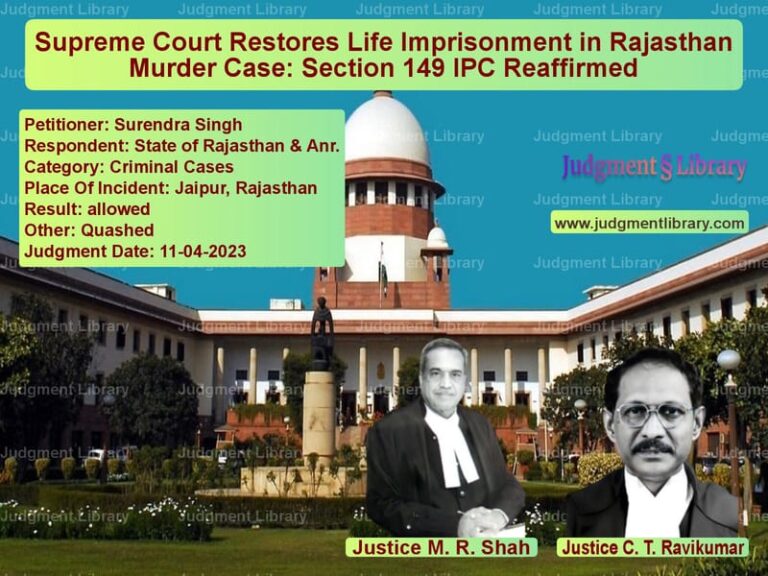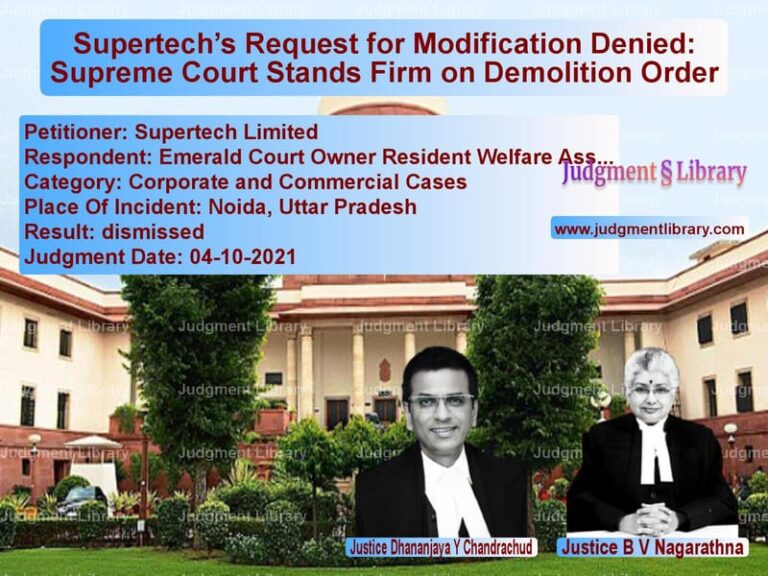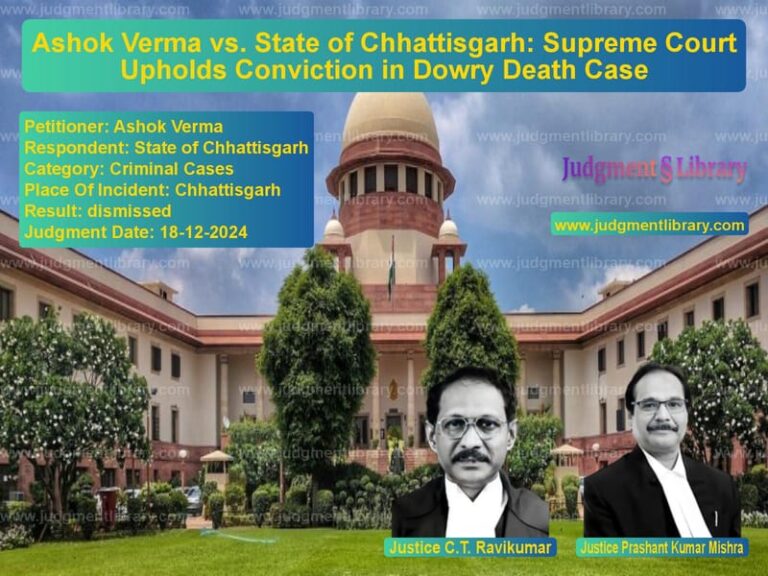Supreme Court Upholds Wife’s Convenience in Matrimonial Case Transfers
The Supreme Court of India, in its recent judgment in Ruchi Rawat v. Principal Judge, Family Court, Etah & Anr., reaffirmed the principle that in matrimonial disputes, the convenience of the wife should be given primary consideration while deciding transfer petitions. The judgment, delivered by Justices S. Abdul Nazeer and J.K. Maheshwari, allowed the transfer of a divorce case filed by the husband from Etah to Mathura, considering the financial and emotional hardships faced by the wife.
Background of the Case
The dispute began when the husband (respondent no.2) filed Original Suit No. 23 of 2018 under Section 13 of the Hindu Marriage Act before the Principal Judge, Family Court, Etah, Uttar Pradesh, seeking divorce. Meanwhile, the wife, Ruchi Rawat, filed cases against her husband in different courts in Mathura. Additionally, the husband had also filed an FIR against the wife at Etah.
In response to the divorce case, the wife approached the High Court of Allahabad seeking a transfer of the case from Etah to Mathura. She contended that she lacked financial independence, was residing with her parents in Mathura, and was emotionally and financially dependent on them. She further alleged that she had been threatened by her husband and his brother while returning from Etah to Mathura after a court appearance.
The High Court of Allahabad rejected her petition, prompting her to file an appeal before the Supreme Court.
Petitioner’s (Wife’s) Arguments
The petitioner, Ruchi Rawat, presented the following arguments before the Supreme Court:
- She is a financially dependent woman and lives with her parents in Mathura.
- Traveling to Etah for court proceedings would impose significant emotional and financial burdens on her.
- She has no independent source of income and is surviving on the support of her parents.
- She faced intimidation and threats from her husband and his brother during her travel from Etah to Mathura after attending a court hearing.
- In matrimonial disputes, it is well established that the convenience of the wife must be prioritized when considering transfer petitions.
Respondent’s (Husband’s) Arguments
The husband opposed the transfer petition, arguing:
- The case should continue in Etah, where he had filed the divorce petition.
- He denied the wife’s allegations of financial hardship and threats.
- Transferring the case to Mathura would cause inconvenience to him.
Supreme Court’s Observations
The Supreme Court considered the facts and legal precedents while deciding the case. The Court referred to the earlier judgment in N.C.V. Aishwarya v. A.S. Saravana Karthik Sha (Civil Appeal No. 4894 of 2022, decided on 18.07.2022), where it was held:
“The cardinal principle for exercise of power under Section 24 of the Code of Civil Procedure is that the ends of justice should demand the transfer of the suit, appeal, or other proceeding. In matrimonial matters, wherever courts are called upon to consider the plea of transfer, the courts have to take into consideration the economic soundness of both parties, the social strata of the spouses, their behavioral pattern, their standard of life prior to the marriage and subsequent thereto, and the circumstances of both parties in eking out their livelihood and under whose protective umbrella they are seeking their sustenance to life.
Given the prevailing socio-economic paradigm in Indian society, generally, it is the wife’s convenience which must be looked at while considering transfer.”
The Supreme Court further noted that the wife’s allegations of financial instability and emotional dependence on her parents were unchallenged and merited consideration.
Supreme Court’s Judgment
After evaluating the case, the Supreme Court ruled in favor of the wife and ordered the transfer of the case from Family Court, Etah, Uttar Pradesh to Family Court, Mathura, Uttar Pradesh. The Court’s ruling included the following directions:
- The order of the High Court rejecting the transfer petition was set aside.
- The divorce case filed by the husband was transferred from Etah to Mathura.
- The Principal Judge, Family Court, Etah, was instructed to transfer all case records to Mathura without any delay.
- Both parties were directed to bear their respective costs.
Impact of the Judgment
The Supreme Court’s ruling reinforces the well-established legal principle that in matrimonial disputes, the convenience of the wife must be prioritized. The judgment has broader implications:
- Protection of Women’s Rights: The decision ensures that women, especially those financially and emotionally dependent on their families, are not burdened with excessive travel and legal expenses.
- Setting a Precedent: It affirms that courts should take a holistic approach, considering the social and financial realities of the parties before making transfer decisions.
- Encouragement for Fair Litigation: The judgment discourages husbands from filing cases in inconvenient jurisdictions to create hurdles for their wives.
Conclusion
The ruling in Ruchi Rawat v. Principal Judge, Family Court, Etah & Anr. is a significant step toward ensuring fairness in matrimonial disputes. The Supreme Court has upheld the principle that the convenience of the wife must be a determining factor in transfer petitions, particularly when she lacks financial independence.
This judgment reaffirms the judiciary’s commitment to protecting women’s rights and ensuring that legal proceedings do not become an undue burden for financially dependent spouses. It is expected that lower courts will continue to apply this precedent in similar cases, fostering a more equitable legal environment in matrimonial disputes.
Petitioner Name: Ruchi Rawat.Respondent Name: Principal Judge, Family Court, Etah & Anr..Judgment By: Justice S. Abdul Nazeer, Justice J.K. Maheshwari.Place Of Incident: Uttar Pradesh.Judgment Date: 05-08-2022.
Don’t miss out on the full details! Download the complete judgment in PDF format below and gain valuable insights instantly!
Download Judgment: ruchi-rawat-vs-principal-judge,-fam-supreme-court-of-india-judgment-dated-05-08-2022.pdf
Directly Download Judgment: Directly download this Judgment
See all petitions in Mutual Consent Divorce
See all petitions in Domestic Violence
See all petitions in Alimony and Maintenance
See all petitions in Judgment by S. Abdul Nazeer
See all petitions in Judgment by J.K. Maheshwari
See all petitions in allowed
See all petitions in supreme court of India judgments August 2022
See all petitions in 2022 judgments
See all posts in Divorce Cases Category
See all allowed petitions in Divorce Cases Category
See all Dismissed petitions in Divorce Cases Category
See all partially allowed petitions in Divorce Cases Category


